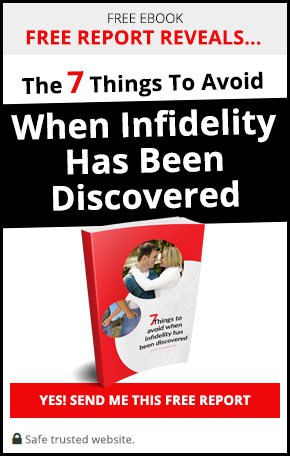
Recovering from an affair is not easy but there are some things you should avoid doing:
1. Keeping anger and emotions bottled up inside. While it’s true that you need to learn how to manage your emotions and control your anger, it’s good – at least initially – to let them all out. Get angry, yell, scream, and do whatever it takes to release these emotions and feelings. Just don’t get to the point where there is any abuse or violence. Learn to understand what these emotions and thoughts really mean and how they affect you and your relationship.
2. Continue to obsess about the other person. You may want to know about the other person – what they look like etc, what the other person had in common with your partner – the list goes on and on. This is one of the most destructive hurdles to overcome when to recovering from an affair. Staring at their picture on Facebook does nothing but make things worse. It’s natural to want (need) to know all you can about the other person, but you MUST let it go at some point. Don’t let the other person have all that power over you.
3. Don’t talk about the affair. The unfaithful partner will absolutely hate to talk about the affair initially and in many cases may never want to discuss it. Talking about the underlying reasons for the affair, what was lacking in your relationship prior to the affair (if anything) and how (or if) you are going to fix things to save your relationship is a necessity.
4. Wallow in self-pity. Yes, you are devastated and feel immense pain, anger, betrayal and hurt. You feel worthless. Your self-esteem and self-confidence are shot. Doubt and uncertainty fill your mind every minute of the day. These are all natural and to be expected.
But you must pick yourself up and work on you. Do things that you enjoy doing – with people you enjoy being with. Rebuild your self-confidence by doing little things that you know you are good at. Get in the best shape of your life. By working on you will help you overcome the hurt and pain of what has happened.
5. Not exploring your own self. At some point you (the unfaithful) must analyse yourself, your vulnerabilities, your own happiness, and what was going on with your life that made you feel bored, unhappy, etc.
6. Ignoring the previous problems in the relationship. Not discussing the problems in the relationship that had a negative effect on your relationship. It’s important you discuss how each of you contributed to the problem issues in the relationship – though not blaming the betrayed partner for the affair or justifying the affair in any way.
7. Devaluing the effects of the affair. For the unfaithful partner, not realising how devastating their affair was to their partner and not appropriately feeling remorseful for their actions or asking for forgiveness. You cannot rush any aspect of the healing process or suggest that the betrayed partner needs to “just get over it and move on.”
8. Not being completely honest with your partner about the affair. The unfaithful partner should not cover up details or only supply half-truths. Eventually everything will come out. Lying to your partner or withholding relevant details only delays the rebuilding of trust and shows that you are not to be trusted.
A note of caution: the betrayed partner who wants to know everything at once. Often, they want to know all the dirty details like how many times their partner had sex, what positions they tried, etc. The betrayed partner understandably wants to know everything, and the unfaithful partner should be honest in answering these questions, but it can do more harm (at least initially) to have this level of disclosure.
The betrayed partner should ask themselves, “Why do I want to know this?” and “Do I really want to know?” (or “What will it do to me to know this?”)
9. Don’t get counselling. Recovering from an affair is something that you cannot go through alone – as an individual – or alone as a couple. It’s important that you utilise a professional therapist or close friend who can be an objective third party and help you recover from an affair. Just be sure to choose your support system wisely.


